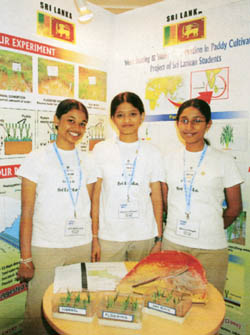|
observer |
|
|
|
|
|
OTHER LINKS |

|

|

|
|
|
|
|
The competition on water conservation, organised by the Stockholm International Water Institute, was conducted in connection with the World Water Week in August. Youth between the ages of 15 and 20 from almost all countries in the world including over 30 developed countries took part. The final objective of the event was to introduce novel techniques to conserve water.
The Industrial Services Bureau of Kurunegala coordinated the local activities; it was advised by ITT Industries, which coordinated the event worldwide.
|
|
Applications for the contest were initially called for on a national basis, and 28 local schools, including some top Colombo schools, responded. Their project proposals were then evaluated in their presence, by a board of academics. The project submitted by the three girls of Maliyadeva Model School, Kurunegala attracted the judges' attention due to its simplicity.
The girls, Mihirani Kethumalika, Uthpala Rathnayake and Achini Rathnayake said that although they submitted only the project proposal, some schools had submitted all relevant information for their projects.
"Our project was about the conservation of water in paddy cultivation. The first step is to plant paddy seeds in separate beds and get paddy plants. Then prepare the paddy fields and insert the paddy plants, leaving spaces of 6"x6" in between. From olden days, Lankan farmers used to flood their fields with water as a method of destroying weeds. The general practice is to leave about 3-4 inches of water in the field when the paddy plants are about 6 inches tall.
"We realised that this method wastes a lot of water as well as being a big problem in the dry zone. The weeds are not completely destroyed either.

"However, our method doesn't need much water, it totally eliminates weeds, is low-cost and the field gets additional fertiliser too," the girls explained.
Under this method, when the plants are about 6 inches high, the field is flooded upto a height of an inch. Then, leaving out the plants, straw is filled in, upto a height of about 2-3" so that the entire ground is covered.
The idea is to prevent sunlight from reaching the ground as this will bring out the weeds.
This project was selected by the local judges to represent Sri Lanka at the contest in Sweden. For over 40 days, the girls were trained in taking part in an international event by the Industrial Services Bureau. The task was aptly handled by Projects Manager, Banduni Premaratne.
The girls were given additional knowledge on the project as well as in English. Samples and computer photographs on the project were prepared by the Bureau. The girls' trip to Stockholm was also organised by Ms Premaratne and Assistant Director of the Bureau, Anura Vidanagamage under the guidance of Executive Director, Gamini Senanayake. The trip was also sponsored by the Bureau.
Countries such as America, Japan, China, India, Thailand, Indonesia and Malaysia took part in the contest and even universities had submitted proposals.
The projects were judged over three days by a panel of academics from different countries. The Sri Lankan project also received their attention and the girls were questioned over its intricacies. Eventually, the local girls won the second place, being beaten by only the Chinese group.
The prize money of 500 dollars and other awards were presented to the team by the Crown Princess of Victoria.
It is opportune if the attention of the relevant authorities is directed to propagate this water conservation method in the dry zone as well as throughout the island. Then, we'll be making use of our own award-winning invention.











